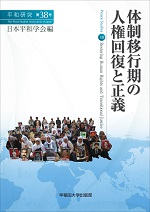38 巻
選択された号の論文の17件中1~17を表示しています
- |<
- <
- 1
- >
- >|
巻頭言
-
2012 年38 巻 p. i-xii
発行日: 2012年
公開日: 2023/11/24
PDF形式でダウンロード (798K)
依頼論文
-
2012 年38 巻 p. 1-22
発行日: 2012年
公開日: 2023/11/24
PDF形式でダウンロード (889K) -
2012 年38 巻 p. 23-40
発行日: 2012年
公開日: 2023/11/24
PDF形式でダウンロード (857K) -
2012 年38 巻 p. 41-56
発行日: 2012年
公開日: 2023/11/24
PDF形式でダウンロード (838K)
投稿論文
-
2012 年38 巻 p. 57-76
発行日: 2012年
公開日: 2023/11/24
PDF形式でダウンロード (829K) -
2012 年38 巻 p. 77-95
発行日: 2012年
公開日: 2023/11/24
PDF形式でダウンロード (835K) -
2012 年38 巻 p. 97-113
発行日: 2012年
公開日: 2023/11/24
PDF形式でダウンロード (851K) -
2012 年38 巻 p. 115-131
発行日: 2012年
公開日: 2023/11/24
PDF形式でダウンロード (833K)
書評
-
2012 年38 巻 p. 133-137
発行日: 2012年
公開日: 2023/11/24
PDF形式でダウンロード (719K)
SUMMARY
-
2012 年38 巻 p. 145
発行日: 2012年
公開日: 2023/11/24
PDF形式でダウンロード (32K) -
2012 年38 巻 p. 146
発行日: 2012年
公開日: 2023/11/24
PDF形式でダウンロード (30K) -
2012 年38 巻 p. 147
発行日: 2012年
公開日: 2023/11/24
PDF形式でダウンロード (30K) -
2012 年38 巻 p. 148
発行日: 2012年
公開日: 2023/11/24
PDF形式でダウンロード (30K) -
2012 年38 巻 p. 149
発行日: 2012年
公開日: 2023/11/24
PDF形式でダウンロード (31K) -
2012 年38 巻 p. 150
発行日: 2012年
公開日: 2023/11/24
PDF形式でダウンロード (30K) -
2012 年38 巻 p. 151
発行日: 2012年
公開日: 2023/11/24
PDF形式でダウンロード (30K)
編集後記
-
2012 年38 巻 p. 153
発行日: 2012年
公開日: 2023/11/24
PDF形式でダウンロード (653K)
- |<
- <
- 1
- >
- >|
